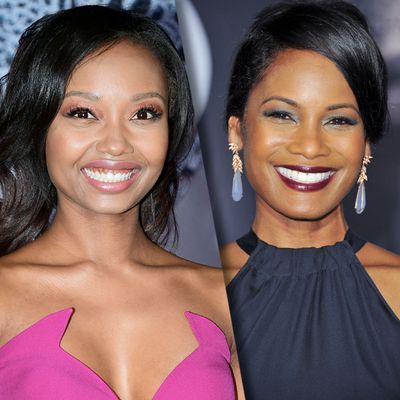
Fifty Shades Darker has earned plenty of criticism for its inability to present a credible depiction of heterosexual sex, lipstick removal, or Vin Diesel fandom. But there is one thing the sequel actually gets right: black women.
Darker only has two black female characters ÔÇö Hannah (Ashleigh LaThrop) and Ros Bailey (Robinne Lee) ÔÇö but the two of them are the movieÔÇÖs true heroes, the only ones in this glossy version of Seattle who come anywhere close to acting like normal people. Whenever a totally unexpected and inexplicable plot device appears to threaten Christian and AnaÔÇÖs dark and stormy romance, either Hannah or Ros is in the frame, ready to serve as our barometer of common sense: Just how crazy can this get?
As VP of Grey Enterprises, Ros Bailey is the closest thing Christian has to a friend-ish figure. (He seems to tolerate his parents and actively disdain his sister.) During one meeting, Christian sits at the head of the conference room, furiously texting Ana. As he types domineering commands ÔÇö ÔÇ£NO,ÔÇØ his thumbs bellow when Ana asks about going to New York City on a work trip with her boss ÔÇö Ros, whoÔÇÖs sitting to his right, looks at him like heÔÇÖs a child. The way she quickly returns her attention to the meeting is like a visual reminder of something Ros has probably known to be true her entire career: Christian is a cartoonishly unqualified and unprofessional boss.
Back at her small Seattle publishing house, Ana has her own black work wife: Hannah. TheyÔÇÖre both eager assistants whoÔÇÖve bonded commiserating about their ornery boss Jack (Eric Johnson). But after that boss makes a pass at Ana, heÔÇÖs fired and sheÔÇÖs promoted to acting fiction editor. ItÔÇÖs a laughably clunky twist: Because Christian is buying the company, he demands JackÔÇÖs resignation, and of course the only person qualified to take over his workload is his assistant. Hannah, who unfortunately is not dating the billionaire who co-owns her place of work, has to stay an assistant ÔÇö AnaÔÇÖs assistant.
This is sticky transition, and Darker handles it with a hilariously glib Working Girl homage. ÔÇ£Do you expect me to call you Ms. Steele?ÔÇØ Hannah asks once sheÔÇÖs managing the iCal of her less-experienced white co-worker. The delivery is pitch perfect here: ItÔÇÖs somewhere between RihannaÔÇÖs response to a demanding fan and Iyanla Vanzant shouting ÔÇ£Not on my watch!ÔÇØ Ana doesnÔÇÖt catch this. ÔÇ£I donÔÇÖt expect you to fetch coffee for me, not unless youÔÇÖre getting it for yourself,ÔÇØ she shrugs. ÔÇ£And as for the rest ÔÇö weÔÇÖll make it up as we go along.ÔÇØ But thatÔÇÖs not what Hannah asked. And Hannah, knowing this, looks at Ana blankly, mutters some well wishes, and exits the office.
But its Ros Baileys last scene that really proves Fifty Shades Darker has a handle on how black women become accessories to white peoples craziness. As Christian pilots a chopper over the wilderness of the Pacific Northwest, the helicopter suffers a mechanical failure. Its not explained  nothing in this movie ever is  but the aircraft is suddenly going down. With Ros sitting in the passenger seat looking deathly afraid, Christian mumbles something about how theyre going down. And then, in a moment of beauty and truth, Ros looks at him like he has no idea who she is. As if shell reduce herself a death with Christian Grey in a helicopter crash! Boy if you dont (Spoiler alert: They survive.)
None of this really revolutionizes the familiar black best friend trope white love stories usually trot out. But with all its messiness, Fifty Shades Darker, at least makes space for a facial expression that only black women are truly expert at: the polite, quizzical look of someone stuck in a situation that simply does not make any sense. Ros and Hannah arenÔÇÖt full characters, but they are fully functional in their shadiness. TheyÔÇÖre the only two people in this self-serious saga who get to have a little fun.


